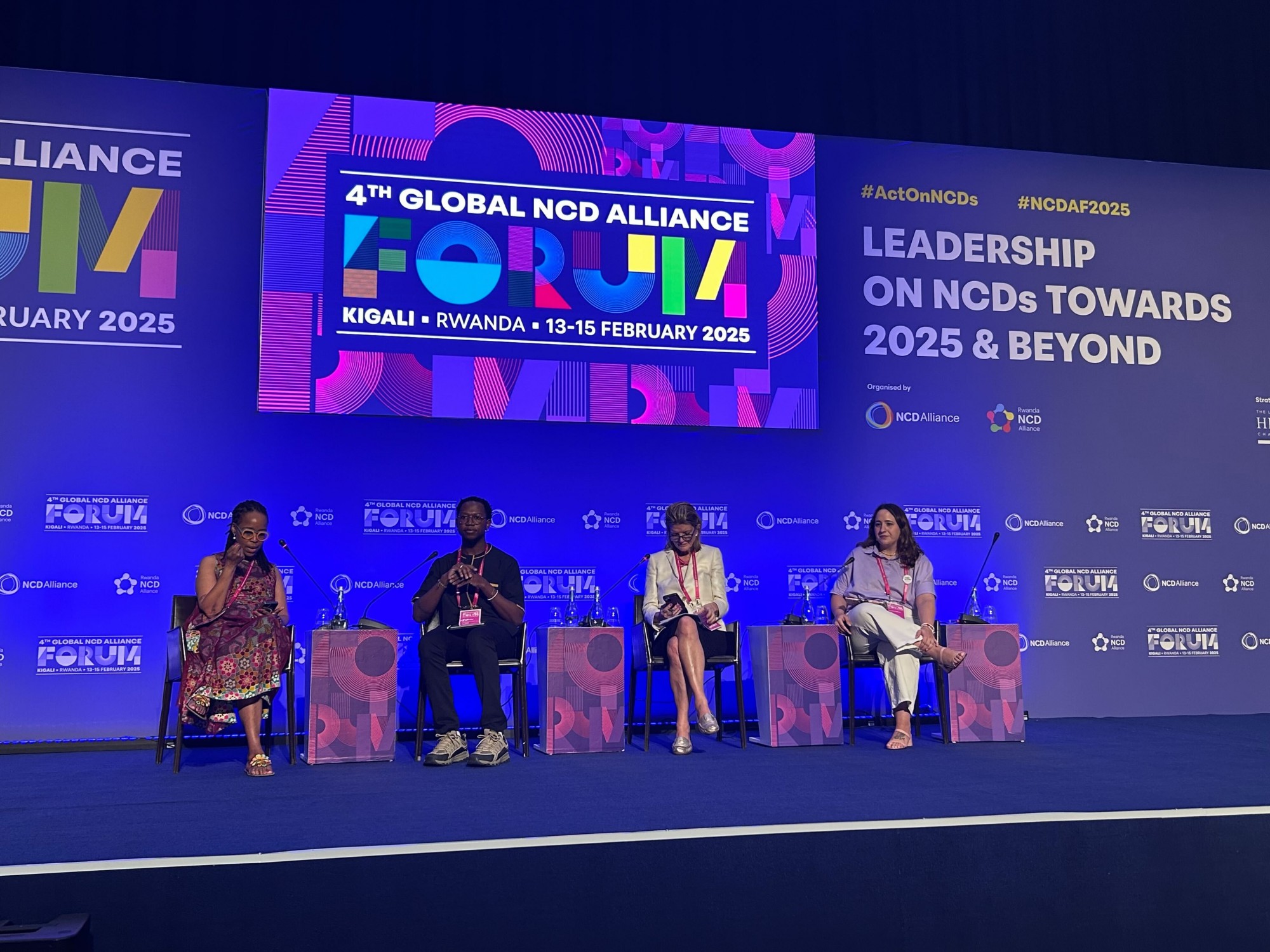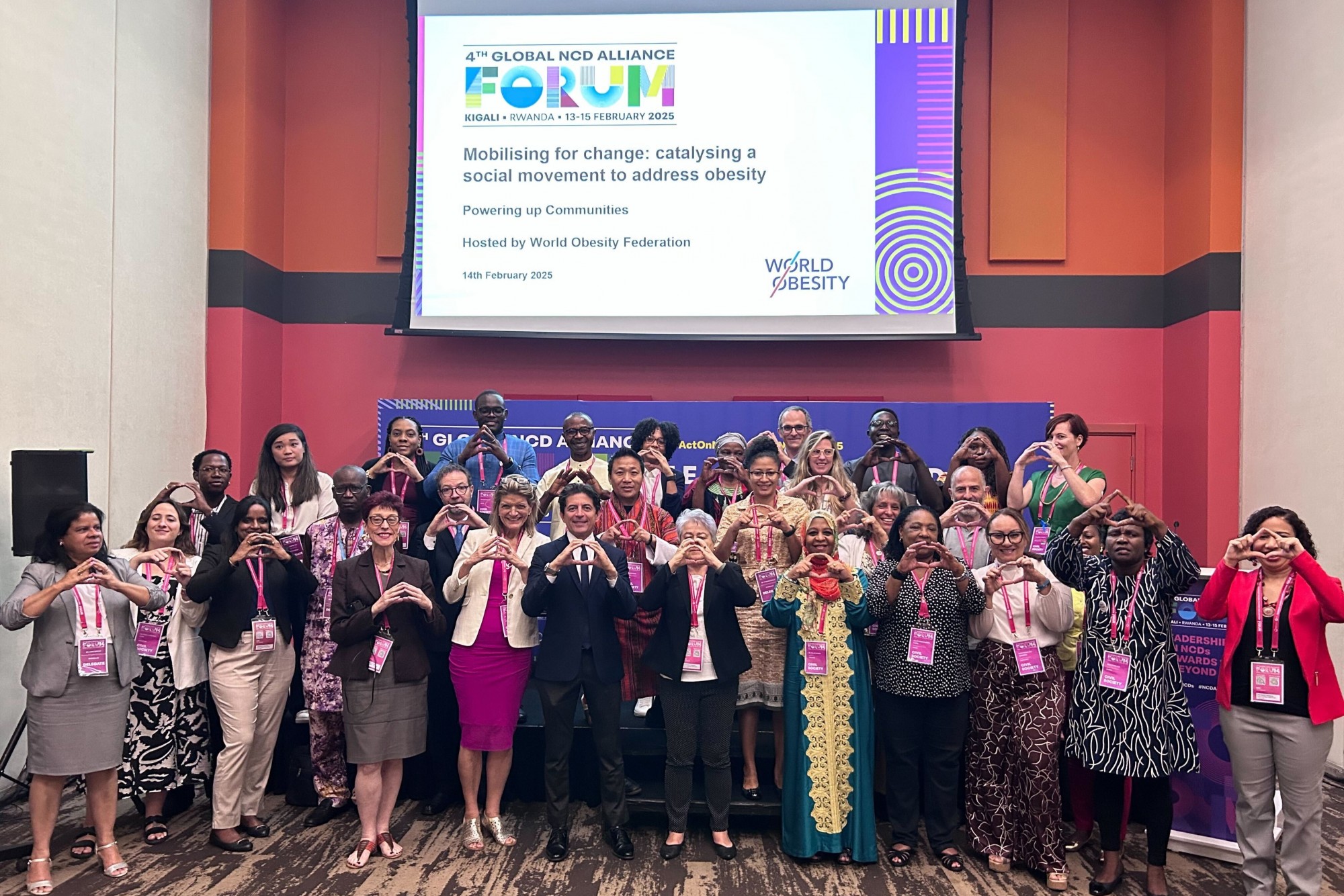Flying the flag for obesity at the NCDA Forum
February 2025
The Global NCD Alliance Forum is a flagship convening event for the NCD movement.
Held in Kigali, Rwanda from 13 to 15 February, the 2025 Forum was organised under the theme ‘Leadership on NCDs towards 2025 & beyond’, bringing together hundreds of delegates from around the world to strategise, coordinate and unite ahead of this year’s UN High-Level Meeting on NCDs.
World Obesity staff and members created a powerful presence: hosting sessions, speaking at events and networking with advocates from other disease areas. Highlights from the week are summarised below.
"The NCDA Forum in Rwanda revealed there is still work to be done to elevate obesity in the NCD agenda, including advancing the WHO Acceleration Plan and comprehensive obesity recommendations adopted by member states in 2022. At the same time, there is a huge demand among NCD groups for concrete help on addressing obesity. My key takeaway from the meeting was how incredibly important lived experience advocates are. World Obesity is committed to supporting people living with obesity to take the lead in our campaign ahead of the UN High Level Meeting."
- Johanna Ralston, CEO, World Obesity
Mobilising for change: catalysing a social movement to address obesity
We hosted this session to highlight how collective action and advocacy beyond health can counter fragmented efforts to forward the obesity policy agenda. Social movements have a proven track record of driving transformative change by mobilising communities, shaping public opinion, and influencing policy. Co-created by World Obesity members and allies, this session focussed on how to catalyse a social movement for obesity, which is already growing in many countries.
Speakers from South Africa, Cameroon, Zambia, Kenya, Uruguay and the Caribbean illustrated case studies of NCDs, tobacco, the joint HIV-obesity challenge, climate and youth and shared lived experience.
"Just as the HIV response moved beyond individual blame to systemic change, so must our approach to obesity. Health systems, policies, food environments, and workplaces all shape rising obesity rates - just as they did for HIV. Obesity is a chronic disease and a driver of diabetes, heart disease, cancer, and poor health outcomes in people living with HIV. Tackling it is essential for health equity. Governments, health professionals, and advocates must unite to transform systems, challenge stigma, and build a healthier future for all." - Nomathemba Chandiwana, South Africa
This was followed by a short Q&A and discussion/knowledge sharing from other participants on how to nurture coalitions, cross-sector collaborations and what's worked from other movements.




Closing the NCD and mental health financing gap: Next steps from the WHO/World Bank Second International Financing Dialogue on NCDs and Mental Health
Co-hosted with United for Global Mental Health, this session reflected on outstanding issues and next steps for civil society arising from the International Dialogue for the Sustainable Financing of NCDs and Mental Health which was held in Washington DC last year.
Panellist Kwanele Asante, from the Africa NCDs Network (ANN) Advisory Group, challenged the narrative that ‘there is no money’ for NCDs and called for accountability mechanisms to ensure governments allocate funds to NCDs. She also highlighted the importance of global health solidarity: "richer countries have to help poorer countries meet health justice needs.”
Panellist María Florencia Leiva, representing the Coalition for Americas Health, described the impact that ‘win-win’ policies like SSB taxes are having in Latin America. She urged policymakers to “stop short-term policies that are like a band-aid: we need policies that will have lasting changes”.

Healthy Cities, Healthy Lives: integrating the response to the Double Burden of Malnutrition and NCDs in LMICs
Co-hosted with the Swiss Tropical and Public Health Institute and the Swiss Agency for Development and Cooperation’s (SDC) Nutrition in City Ecosystems (NICE) project, this session focused on the double burden of malnutrition - where undernutrition and overweight and obesity coexist. In urban settings across low- and middle-income countries (LMICs), the double burden of malnutrition is worsening, accelerating the rise of NCDs and placing increasing pressure on healthcare systems.
This session brought together a diverse panel of experts from multiple sectors, including our Head of Policy and Advocay, Maggie Wetzel. Key takeaways from Maggie's presentation were:
- Double burden has been steadily rising globally
- Women are most affected, particularly in the African continent and low- and middle-income countries
- High levels of double burden are being driven by obesity
The panel included our President, Simón Barquera, and discussed challenges, community-driven initiatives, and coordinated multisectoral actions to address the double burden of malnutrition and NCDs.



Catalysing action on obesity
Throughout the Forum, World Obesity connected with allies at our booth. We asked people what their top asks to governments were for the 2025 HLM on NCDs, and how the NCD community can help catalyse action on obesity. Here are some of their priorities:
-
Urgent multisectoral action to address the roots of obesity and reduce risk of other major NCDs
- Meaningfully involve people with lived experience

Get involved
Over the coming months, World Obesity will be convening advocates and exploring key issues in thought leadership pieces. We encourage everyone to join us in advocating for stronger commitments on obesity ahead of the Fourth UN High-Level Meeting on NCDs.
Follow us on social media to keep up to date on our efforts to reshape the global response to obesity and NCDs.
Contact us